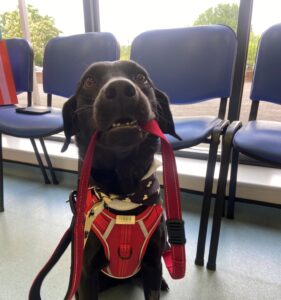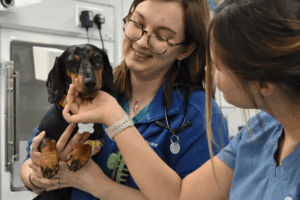Summertime can be full of fun for everyone, including our four-legged friends. However, when the temperatures rise, the risks to our pets can too.
To help keep them safe, we’ve pulled together a list of the most common dangers to pets over the summer, as well as some top tips to help you avoid them.
Heatstroke and dehydration
Our pets (dogs especially) aren’t as good as humans at dealing with higher temperatures as they find it harder to cool down. While any pet can develop heatstroke, those that are large, older, energetic, overweight, flat-faced or have a thick coat will be more at risk than others.
Signs of heatstroke include:
- Heavy panting
- Breathing problems
- Lethargy / stiffness
- Drooling
- Vomiting & diarrhoea
- Confusion
- Fitting
If you think your pet may have heatstroke, it is vital that you contact your vet immediately and try to cool them down.
How to prevent heatstroke:
- Walk dogs at cooler times of day – early morning or evening (avoid midday sun)
- Check your pet has constant access to fresh water
- Bring portable water bowls on walks and when travelling in the car
- Attach leads to harnesses rather than collars to prevent pressing on airways
- Put down a cool mat or damp towels for pets to lie on at home
- Ensure pets always have shaded space
- Never leave pets in the car by themselves, even on a mildly warm day
- Move small pets into a cooler part of the house or garden and keep enclosures out of the sun
- Keep long or heavy coats clipped
Hot pavements
Pavements can be deceptively hot on sunny days and will usually be much warmer than the air outside. Sometimes, the ground can become hot enough to burn your dog’s paws. If it’s too painful for you to place the back of your hand on the pavement for seven seconds, then it’s too painful for your dog to walk on.
Insect bites and stings
The severity of an insect bite or sting will depend on the type of insect, the location of the bite/sting and whether your pet is allergic to them. Typical signs can include redness, pain and swelling.
If your pet is stung in the mouth or throat, or you think they may be having an allergic reaction to a bite or sting (symptoms include vomiting, diarrhoea, large swelling, weakness, breathing problems and disorientation), speak to your vet immediately.
Ticks
Remember to check your pet for ticks every day, taking extra care with any thicker coated animals where the ticks may not be immediately obvious.
If you haven’t organised tick treatment for your pet yet, consider signing up for our Pet Care Plus Plans. Tick treatments, as well as flea and worming, are included and will be posted directly to your door with simple low monthly payments. Find out more and sign up today.
Barbecues
We all love a barbecue in the summer, but they can actually pose quite a few risks to your pets. Food is generally more easily accessible, so your pet may use every opportunity to sneak a snack off your plates or the floor!
Some surprising foods such as grapes, raisins, onions and garlic can be toxic to dogs and cats if consumed in large quantities and should stay off their menu.
Beaches
Most people will assume that their pets (especially dogs) are excellent swimmers; however, the fact remains that even the best swimmers can struggle to get out of water safely. If you decide to take your dog into the sea, always make sure you assess the conditions first and avoid if it is rough.
Not all dogs will like the sea, so always take their lead on what they want to do. Always start in shallow water first and remember not to throw toys into deep areas.
Lakes, ponds and rivers
As with the sea, you need to assess if the lake or river is calm before letting your dog swim. You should also look out for any dangers, such as trees, branches boats or rubbish first.
Blue-green algae can be found in many bodies of water throughout the UK, which can produce toxins that may be harmful to pets. Water that contains blue-green algae may appear a different colour or could be recognizable from the coloured blooms that will appear on the surface of the water or close to the shore. It’s impossible to know if there are any toxins in the water without testing so, on these occasions, it will be best to avoid letting your pet near.
Flowers and plants
It’s lovely watching the flowers in your garden and out on your walks bloom in the summer, but it’s important to remember that certain species can be toxic to your pets.
Some of the most common toxic summer plants include:
- Lillies
- Daffodils
- Irises
- Tulips
- Azaleas
- Hyacinths
- Hydrangeas
- Foxgloves
- Geraniums
- Mushrooms/funghi
- Giant hogweed
- Yuccas
Flystrike
Flystrike in rabbits is particularly common during the warmer months and is caused by flies laying eggs on their body. The condition can be fatal so it’s important you check your rabbit’s fur (particularly around their bottom and tail) at least twice daily over summer.
To help prevent flies from laying eggs, keep your rabbit’s hatch and run clean with fresh bedding every day. Also, keep an eye out for sores or open wounds and ensure they’re kept clean and dry.
There are products available to help protect rabbits, including spot-on formulas and sprays that prevent the eggs from developing. Get in contact with your local St Kitts branch to discuss the options for your pet.
Slug and snail pellets
Many slug and snail pellets are dangerous to your pets, with the active ingredient in most, metaldehyde, being highly toxic to both cats and dogs. Eating even just a small amount can cause severe problems, so it’s best to find an alternative to eliminating slugs and snails from your garden.
Toads
Common and natterjack toads are native to the UK and are largely found in forests and wet locations. Try to keep your pet away from them as when ingested or mouthed, they can cause issues such as vomiting, frothing/foaming at the mouth, hypersalivation and shaking.
If you are concerned about your pet and would like some advice, please contact your local St Kitts branch.
St Kitts Veterinary Centre: 01252 844044
Basingstoke Veterinary Centre: 01256 844944
Crookham Park Veterinary Centre: 01252 913990
Firgrove Veterinary Centre: 01252 877799





